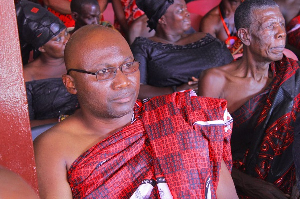- Home - News
- TWI News | TV
- Polls
- Year In Review
- News Archive
- Crime & Punishment
- Politics
- Regional
- Editorial
- Health
- Ghanaians Abroad
- Tabloid
- Africa
- Religion
- Election 2020
- Coronavirus
- News Videos | TV
- Photo Archives
- News Headlines
- Press Release
General News of Friday, 9 October 2015
Source: Today Newspaper
Give us emergency lanes - NAS Boss
Chief Executive Officer (CEO) of the National Ambulance Service (NAS) Prof. Ahmed Nuhu Zakaria, has called on the authorities to incorporate emergency lanes in the design and construction of new roads to reduce the turnaround time for ambulances.
This, Prof. Zakaria noted, was necessary to save time and lives.
Speaking in an interview yesterday the CEO of NAS lamented the difficulties ambulances face when attending to emergency cases such as conveying patients and victims of accidents due to heavy traffic jams.
He believes such problems could be easily addressed when dedicated emergency lanes are built for the use of emergency services.
“If you have an emergency and you have to rush to the hospital and the road is choked, there is nothing you can do. So if we had the emergency road then definitely they will be free but currently we don’t have,” he stated.
He was speaking on the support needed for an efficient and timely emergency service.
Prof. Nuhu Zakaria said the country’s emergency service is well structured now and emphasised the need to begin to do things that enhance the work of the service.
Touching on funding challenges for NAS, he said currently all emergency services undertaken by his outfit are free of charge.
And that, according to Prof. Zakaria, was putting pressure on their already meagre budget they get from the government.
According to him, that informed their decision to start to contemplate about charging for their services, especially non-emergency services like social programmes, or referral cases.
He indicated that for emergency services they virtually render it for free since the patient cannot be asked to pay. He, however, said NAS finds other means of getting reimbursed.
He observed that in other jurisdictions, ambulance services including pre-hospital services are covered by insurance but “currently if a patient doesn’t have insurance, the service we provide [In Ghana] is free and if you don’t have a way of recouping whatever we spend, your expenditure will be more than what you earn.”
He said occasionally they depend on the National Health Insurance for support, especially on emergency hospital services.
But he indicated the need to capture emergency service under the NHIS and disclosed that the Ambulance service is in talks with the National Health Insurance Authority (NHIA) in this regard.
Currently, the National Ambulance Service has 132 stations dotted across the length and breadth of Ghana, with 1700 staff.
The Ghana Ambulance Service aims at providing accessible 24-hour ambulance service nationwide through its own ambulance service and by collaborating with other service providers such as the Fire Service and other hospital-based ambulances.
The service also provides improved pre-hospital care in accidents, emergencies and disasters.











